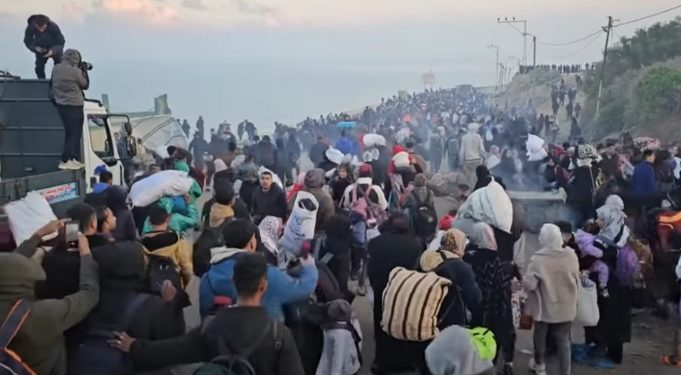Hundreds of thousands of displaced Palestinians in the Gaza Strip are facing a new cold wave during the ongoing displacement crisis caused by the Israeli war of extermination.
The dilapidated tents placed in the open are too weak to withstand the strong winds, while the rains sweep away most of these temporary shelters for millions of Palestinians who lost their homes.
The current low temperatures deepen the humanitarian crisis that has been ongoing for months, as displaced Palestinians are using worn plastic covers to shelter themselves due to the severe shortage of heating means and food.
The situation is further deteriorating under the ongoing siege, especially with the absence of any real solutions to shelter the displaced or provide them with adequate aid.
Civil Defense warnings in the Strip confirm that strong winds and heavy rains may lead to the collapse of many camps, as the Israeli occupation continues to prevent the entry of basic supplies, including tents and mobile homes.
It is estimated that more than 1.5 million Palestinians have become homeless after their homes were completely destroyed, while the remaining population lives in a state of near-total collapse of basic services. Electricity is cut off, water is scarce, and fuel is unavailable, making winter even harsher for displaced families, especially children and the elderly.
Despite the ceasefire agreement, the Israeli occupation continues to prevent the entry of essential supplies, in clear violation of international conventions that guarantee the provision of basic needs to civilians in times of conflict and humanitarian disasters.
The situation of displaced Palestinians in the Gaza Strip is in contravention of international humanitarian law, which imposes on the occupying authorities the responsibility to secure the basic needs of the population under their control. According to the Geneva Conventions, the deliberate deprivation of humanitarian aid, especially food and shelter, is a war crime that requires international accountability.
The Universal Declaration of Human Rights and the International Covenant on Economic, Social and Cultural Rights also stipulate the human right to adequate housing, clean water, and adequate food, rights that the vast majority of the population of the Strip is deprived of due to the policy of collective punishment imposed by Israel.
With the continued forced displacement, siege and denial of access to aid, the voices of international human rights organisations are rising to demand an end to these violations, which amount to a crime against humanity according to the Statute of the International Criminal Court. However, the international community remains too weak to impose any practical measures to ensure the protection of Palestinians and alleviate their humanitarian suffering.
In light of these conditions, displaced Palestinians in Gaza are left with two bitter choices: facing the harsh winter inside tents that do not protect them from the cold, or waiting for an international response that seems far-fetched in light of the occupation’s continued repressive policies without deterrence.



























